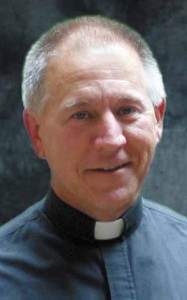By Fr. Bud Grant
A recent article in Wallaces Farmer dismissed global warming while, oddly, also confirming many of the most salient and alarming facts about its already perceived impact. The author employed a rhetorical devise custom-designed to stroke the self-image of the Iowa farmer. In reference to the fact that last winter was one of the coldest on record, L.S. Leonard quotes Patrick Michaels of the Cato Institute in saying that “Iowa farmers are known for their good sense.” By the way, this is exactly why the term “global warming” is no longer used: it was always a misleading description of what we are experiencing. Michaels’ jibe is that it is just common sense that climate change must be a hoax: “In Iowa this winter,” Leonard writes, “the last thing farmers worried about was surface temperatures being too warm” (Wallaces Farmer, March 2014, 66).

This reference to common sense got me reviewing one of the most important contemporary studies of epistemology (the exploration of how we come to know anything). In his book “Insight,” Jesuit scholar Bernard Lonergan credits common sense as a valid and powerful mode of knowing, in many ways akin to scientific knowledge. We begin by asking questions that arise from experience, and then we come up with a hypothesis about how to explain that experience, test it against other experiences to establish trends, and finally draw a practical conclusion about it. So: we experienced last winter as unusually cold, which contradicts the theory of “global warming.” We find that it was, indeed, one of the coldest years in recent memory, ergo, global warming vis climate change is wrong.
We use this short-hand method all the time, quite often with good, or at least not bad, results. It is so readily at hand, so habitually applied, so practical, and so seemingly valid that we put stock in it as, well, “common” sense. Not incidentally, this jimmy-rigged practical logic reinforces a peculiarly American distain for “impractical” theoretical formal education which prefers common sense to being merely “book smart.”
But Lonergan warns us of the limits and traps of common sense. Because we refer the experience in question only to our own subjective experiences, we remain trapped in particular circumstances and expectations. Put simply: common sense blinds us to anything that does not fit into our pre-determined expectations. Common sense, then, becomes a comforting lie we impose on ourselves. This leads not to insight, but to a “flight from understanding” which can become a pathological disorder, a refusal to understand (Insight 200).
This sounds rather damning, and I suppose it is. After all, racism was once “common sense” to many. Xenophobia (a fear of foreigners) drives our immigration debates and other pathologies inform (or rather, deform) conversations about everything from gay marriage to, well, climate change. Lonergan spends the remainder of his 785-page book offering an alternative which, fortunately, can be quickly summarized.
One: be attentive. Pay attention to what is going on around you and ask good questions.
Two: be intelligent. Seek out data, facts, research … answers.
Three: be reasonable. Assemble your answers into a coherent vision of reality.
Four: be responsible. Put that vision of the world into practice.
Five: repeat, because our flawed visions of the world need tweaking.
Lonergan’s method is more helpful than reliance on common sense and, anyway, it is simply a better description of what we all are already doing. One case in point is also in Wallaces Farmer, in a rebuttal to the global warming article that concluded with this insight: “Many farmers may not realize it but we are also informal scientists … if farmers studied the same information climate experts do, we would eventually come to the same understanding that humans are causing climate change. Once we realize that, we also realize that humans can do something about it” (Eric Johnson, in May 2014, 11).
(Father Bud Grant is a professor of theology at St. Ambrose University in Davenport.)








